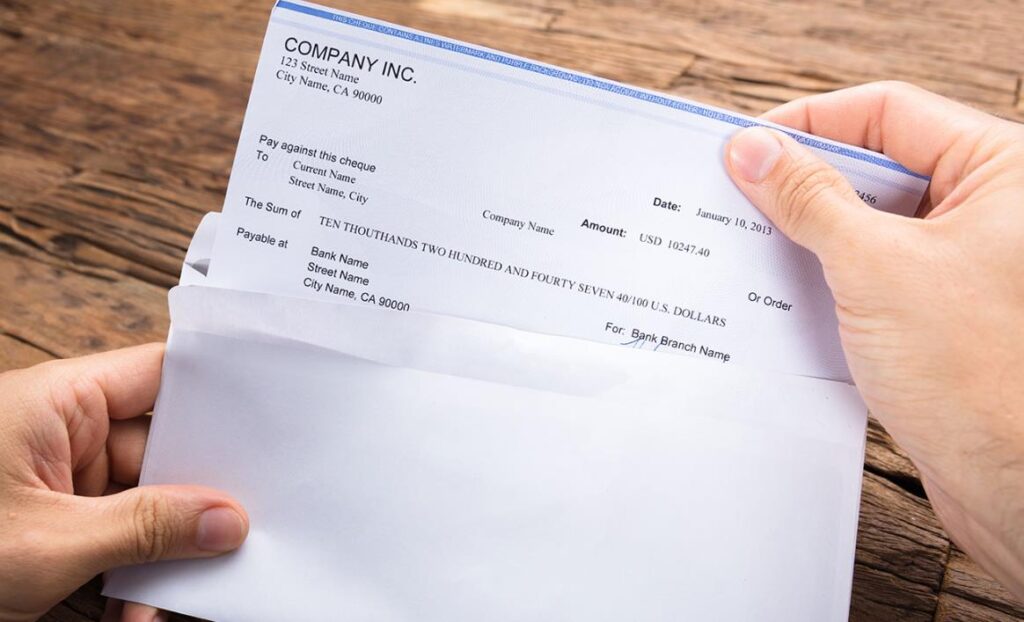Are you looking for the reasons Why Is Mortgage Company On My Insurance Check? It’s a question that puzzles many homeowners. The answer lies in the financial interest your mortgage company holds in your property. When you file an insurance claim for property damage, the check often includes the mortgage company’s name because they have a vested interest in ensuring the property is repaired.
Key Takeaways
- Mortgage companies have a financial interest in your property.
- The mortgage agreement usually outlines how insurance proceeds will be handled.
- Mortgage companies may apply insurance proceeds to your loan balance or to repair costs.
- State laws can influence the mortgage company’s rights to insurance proceeds.
- Always consult your mortgage agreement for specific details.
Why Is Mortgage Company On My Insurance Check?
The mortgage company is named on your insurance check because they have a financial interest in your property. When you have a mortgage, the lender is invested in keeping the property in good condition. Therefore, the insurance check often comes made out to both the homeowner and the mortgage company.

Does a Mortgage Company Have a Right to Your Insurance Proceeds?
Yes, if you have a mortgage on your property, your mortgage company does have a right to your insurance proceeds. This is primarily because most mortgage agreements stipulate that the borrower must maintain insurance coverage on the property.
The mortgage company’s right to receive insurance proceeds is often reflected in the mortgage agreement itself. In essence, the mortgage company has a vested interest in ensuring that the property, which serves as collateral for the loan, is restored to its pre-damage condition.

The mortgage company’s right to insurance proceeds is well-established in law. For instance, in Florida, it is settled law that the mortgage company has a right to the insurance proceeds.
This right extends to the point where the mortgage company can hold the insurance proceeds in an escrow account and disburse them to fund repair costs. In some cases, the mortgage company may even apply the insurance proceeds to the outstanding debt, depending on the language in the mortgage agreement.
The mortgage company’s right to your insurance proceeds is not arbitrary but is rooted in legal and contractual obligations. Understanding these nuances can help you navigate the complexities of dealing with insurance checks and mortgage companies. Always refer to your mortgage agreement for specific details on how the mortgage company may handle insurance proceeds.
What Will the Mortgage Company Do With The Insurance Proceeds?
The actions taken by the mortgage company with your insurance proceeds largely depend on the language specified in your mortgage agreement. Typically, the mortgage company will deposit the insurance proceeds into an escrow account.
From this account, they will issue payments to fund the repair costs of your property. This ensures that the funds are used specifically for restoring the property to its pre-damage condition, aligning with both your interests and those of the mortgage company.

However, there are instances where the mortgage company might apply the insurance proceeds directly to your outstanding loan balance. This usually happens if the loan is in default.
Even if the loan is not in default, the mortgage company may still opt to apply the insurance proceeds to the outstanding debt, rather than using them for repairs. This is particularly true if the mortgage agreement explicitly gives the mortgage company the discretion to decide how the insurance proceeds are applied.
Does The Mortgage Company Have a Right to The Full Amount of The Insurance Proceeds?
The mortgage company’s right to the full amount of the insurance proceeds is generally not absolute. In most cases, the mortgage company will hold the insurance proceeds in an escrow account and release them as repairs on the property are completed. The primary goal is to ensure that the property, which serves as collateral for the mortgage, is restored to its pre-damage condition.

However, it’s essential to note that the mortgage company should not be able to keep insurance proceeds in excess of the remaining amount of the loan secured by the mortgage.
For example, in California, the standard mortgage agreement specifies that the mortgage company can only hold money up to the amount of the outstanding loan balance. Therefore, if the insurance checks total more than your mortgage, the lender should not keep more money than the remaining amount you owe them on your mortgage.
How to Handle Insurance Checks with Mortgage Company’s Name?
Handling an insurance check with your mortgage company’s name on it involves a series of steps to ensure the funds are used appropriately. The first thing you should do is contact your mortgage company, specifically their ‘loss draft department’.
They will guide you through their specific procedure for getting the check endorsed and cashed. This often involves submitting a packet of documents, including a copy of your loss and a contract from your contractor detailing the work to be done.

Different mortgage companies have varying requirements. Some may require a final invoice from the contractor, while others may demand an affidavit from the homeowner or contractor stating that the damage will be fixed.
In some cases, the mortgage company may even hold the funds in escrow, releasing them in stages or upon completion of the repair work. The quicker you initiate this process, the faster you can access the funds to begin repairs on your property.
State Laws and Their Impact
State laws can also influence how mortgage companies handle insurance proceeds. For example, in Florida, it’s a well-settled law that mortgage companies have a right to insurance proceeds, but only up to their security interest in the property.
Navigating the process when your mortgage company’s name is on the insurance check can be tricky. The first step is to endorse the check and send it to your mortgage company. They may require additional documentation, such as repair estimates, before releasing the funds. It’s crucial to maintain open communication with your mortgage company throughout the process to ensure a smooth transaction.

In some cases, the mortgage company may hold the funds in an escrow account and release them in installments as repairs are completed. This is often done to ensure that the funds are used specifically for property repairs. Make sure to understand these terms to avoid any surprises down the line.
What if the Loan is in Default?
If your loan is in default, the situation becomes more complex. The mortgage company may choose to apply the insurance proceeds directly to the outstanding loan balance. This is especially likely if the mortgage agreement explicitly states that the lender can do so. Therefore, it’s essential to review your mortgage agreement carefully if you find yourself in this situation.
Even if the loan is not in default, the mortgage company might still opt to apply the insurance proceeds to the outstanding debt. This is a discretionary decision on the part of the mortgage company and is usually outlined in the mortgage agreement.
Legal Implications and Your Rights
You have rights as a homeowner, even when your mortgage company is involved in your insurance claim. For instance, if the insurance check amount exceeds the remaining loan balance, the mortgage company cannot keep the excess. This is a legal safeguard to ensure that homeowners are not unfairly deprived of funds that rightfully belong to them.
However, the mortgage company does have a right to the insurance proceeds up to the amount of their security interest in the property. This is well-established in law and is usually reflected in the mortgage agreement you signed when obtaining the loan.
When to Seek Legal Advice?
If you find yourself in a complicated situation where you’re unsure of how to proceed, it may be wise to seek legal advice. An attorney can help you understand your rights and obligations under your mortgage agreement. They can also guide you through the process of dealing with your mortgage company and insurance provider.

Legal advice becomes particularly crucial if there’s a dispute between you and your mortgage company over the use of insurance proceeds. A legal expert can help you navigate the complexities and ensure that your interests are protected.
Can I Deposit A Check Made Out To Me And My Mortgage Company?
Depositing a check made out to both you and your mortgage company isn’t as straightforward as depositing a check made out only to you. The mortgage company will often require that the check be sent to them for deposit into an escrow account.

From there, the funds are usually disbursed in stages as the repair work progresses. This process ensures that the funds are used for their intended purpose, which is to restore the property to its pre-damage condition. You’ll need to endorse the check and may also need to provide additional documentation, such as repair estimates or invoices, to your mortgage company.
Payments are often made out to both you and the contractor, requiring dual endorsements. This adds an extra layer of paperwork but is designed to protect all parties involved. It’s crucial to maintain consistent communication with your mortgage company throughout this process to ensure smooth transactions.
Why Does Mortgage Company Pay Home Insurance?
The mortgage company doesn’t actually pay your home insurance; however, it is common for homeowners to set up an escrow account through their mortgage company for insurance and taxes.
The mortgage company has a vested interest in your property and wants to ensure that it remains insured. As a listed lien holder on your insurance policy, they aim to protect their financial interest by making sure the property is restored to its pre-damage state in case of any damage. This is why they are often involved in the insurance claim process and why they may be named on the insurance check.

The mortgage company may require that the insurance proceeds be held in escrow while the repair work is being completed. This is to ensure that the funds are used specifically for property repairs and not for any other purpose.
Why Does An Insurance Check Have Mortgage On It?
An insurance check often includes the mortgage company’s name because the mortgage company has a financial interest in your property. When you take out a mortgage, the property serves as collateral for the loan.
Therefore, the mortgage company has a vested interest in ensuring that any damage to the property is adequately repaired. This is why they are often named as a co-payee on insurance checks for property damage claims.
The mortgage company’s involvement ensures that the funds are used for their intended purpose, which is to restore the property to its pre-damage condition. This is often facilitated by holding the funds in an escrow account and disbursing them in stages as the repair work is completed.
Conclusion
In conclusion, your mortgage company is on your insurance check because they have a financial stake in your property. The mortgage agreement usually dictates how these funds are used. Always consult your mortgage agreement and consider state laws when dealing with insurance checks that include your mortgage company’s name.
Whether your loan is in default or you’re just navigating repairs, knowing the terms of your mortgage agreement is crucial. Always consider seeking legal advice if you find yourself in a complicated or contentious situation.
Top FAQ’s
Why can’t I just deposit and use my insurance checks?
You might wonder why the insurance check has to go through your mortgage company when you’ve paid the premiums. The reason is that your mortgage company is co-insured on your property. This setup protects the mortgage company in case you decide to take the insurance money and not rebuild your property. Essentially, your property serves as collateral for the loan, and the mortgage company wants to ensure it remains in good condition.
Will the mortgage company be a co-insured on only the Coverage A checks?
The mortgage company may also be named on checks issued for “Other Structures” and “landscaping.” It’s a good rule of thumb to assume that the mortgage company could claim a right to be treated as a co-insured on insurance coverage for things that are or must stay on the property when sold.
Why does the company need such a policy if it already is part of the mortgage?
The mortgage company has a special department, often called the “Loss Department,” that handles control of rebuilding money after a catastrophic property loss. The people you deal with may not know what the mortgage actually says, so it’s crucial to read and understand your documents.
How quickly can I get the lender to release the insurance checks?
The process is usually not as quick as you’d hope. Your mortgage company understands that a builder is not going to do all the work before getting paid. Therefore, you will get the money in “progress payments,” typically released in installments based on the completion percentage of the rebuild.

Muhammad Talha Naeem is a seasoned finance professional with a wealth of practical experience in various niches of the financial world. With a career spanning over a decade, Talha has consistently demonstrated his expertise in navigating the complexities of finance, making him a trusted and reliable figure in the industry.









